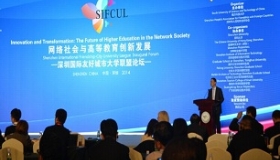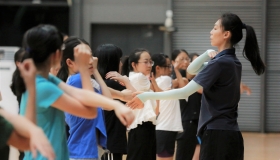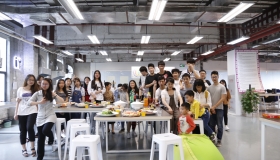The Chinese Culture Colloquium: YUE Nan
On November 28th, YUE Nan, a best-selling author, gave a lecture as part of the Chinese culture colloquium at Chinese University of Hong Kong, Shenzhen. He introduced the history of the Southwest Associated University (西南联大) in addressing “the Patriotism of Intellectuals in the Wartime”.
Yue Nan started his speech with introducing the history of the anti-Japanese War which broke out in 1937, when Peking University, Tsinghua University and Nankai University merged to form Changsha Temporary University in Changsha, and later National Southwestern Associated University in Kunming, capital of Yunnan province in China's remote and the mountainous Southwest. After the war, the universities moved back and resumed their operation.
These three universities, which were some of the country's most prestigious, modern educational institutions of higher learning and research, decided to retreat to Changsha, the capital city of Hunan province, (about 900 miles away from Beijing) in order to unite together. Although by the middle of December 1937, many students had to leave to fight the Japanese when the city of Nanjing fell to the enemy forces.
As the Japanese forces were gaining more territory they eventually bombed Changsha in February 1938. The 800 staff faculty and students left had to flee and made the 1,000 mile journey to Kunming. In these extraordinary wartime circumstances for eight years, staff, professors and students had to survive and operate in makeshift quarters that were constantly being subjected to sporadic bombing campaigns by the Japanese forces. There were dire shortages of food, equipment, books, clothing and other essential needs, but they did manage to conduct the running of a modern university. Over those eight years of war (1937-1945), the Southwest Associated University became famous nationwide for having and producing many, if not most, of China's most prominent academics, scholars, scientists and intellectuals.
Yue Nan described how the staff and students spent the war years striving to uphold a model of higher education, and sought to preserve liberal education, political autonomy, and academic freedom. In his closing remarks, Mr. Yue shared his observation of the patriotic spirit of the former generation, encouraging the students of CUHK (SZ) to carry forward the patriotism.
At the end of the lecture, Pro. Yangsheng Xu, President of the Chinese University of Hong Kong, Shenzhen, presented a souvenir of the Chinese Culture Colloquium to show the compliments to Mr. Yue. Student clubs, Jinhui and Calligraphy Club, also presented their hand-made calligraphy folding fans to Mr. Yue.
About the Speaker
Mr. YUE Yuming, popularly known as YUE Nan, a former write-in residence at National Tsing Hua University of Taiwan and a best-selling writer in the rich list of Chinese writers, was born in Zhucheng of Shandong Province in 1962. After graduating from Zhucheng No. 5 middle school, he entered the Arts College of the People’s Liberation Army majoring in Chinese Literature. Later on, he became a postgraduate of Beijing Normal University’s Lu Xun Literature College.
YUE Nan is a member of Chinese Writers Association, also the Vice President of Archaeological Society of China. YUE Nan is good at weaving new discoveries in history and archaeology into his literary works, presenting a picture of glory and dreams of the ancient empire to the readers. Published by Beijing Commercial Press in March, 2012, his 11 volume China Archaeological Exploration Documentary Series, one of his major works, is regarded as the most influential archaeology literature series in China. Among other things, YUE Nan has shown some particular interest in the life of the intellectuals in the Republican Era of China, and his trilogy, Nan Du Bei Gui, or Voyaging South, Back to the North(《南渡北归》), which took him 8 years to produce, have received due praise from readers and sold well since published.






